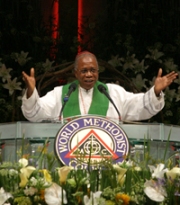The head of the Vatican organization in charge of ecumenism has reminded bishops of Asia that the Second Vatican Council taught Christ's Church is to be found only in the Roman Catholic Church, reports the Hong Kong based news agency UCAN.
Cardinal Walter Kasper, president of the Pontifical Council for Promoting Christian Unity, acknowledged that the Second Vatican Council left room for dialogue, but "it also wants to maintain that the Church of Christ has its concrete location in the Roman Catholic Church. It is there that it is found."
Kasper presented his remarks to 35 bishops, priests, religious and lay persons attending a seminar July 18-20 in Uiwang near Seoul in Korea.
Cardinal Kaspar's council jointly organized the seminar, The Search for Christian Unity: Where We Stand Today, with the Federation of Asian Bishops' Conferences (FABC). The participants, representing eight national [Roman Catholic] Episcopal Conferences in Asia, came from Bangladesh, Hong Kong, India, Indonesia, Korea, Macau, Myanmar, the Philippines, Thailand and Vietnam.
When he addressed the participants on July 18, the cardinal noted that "oneness" and "unity" are key terms in the New Testament and the Creed, where "we confess our belief in the one, holy, Catholic and apostolic Church."
Even so, he said, divisions have arisen all through Church history, such as the division of the pre-Chalcedonian Churches in the fifth century, the separation of the Eastern and the Western Churches in the second millennium, and the Reformation led by Martin Luther in the 16th century.
Questions about where the true Church can be found, he said, are answered in the Second Vatican Council document Lumen Gentium ("Dogmatic Constitution on the Church"), which states that the "Church constituted and organized in the world as a society, subsists in the Catholic Church, which is governed by the successor of Peter and by the bishops in communion with him."
Church unity, he said, is not an accidental reality but at the very center of God's will and the Catholic faith. Conversely, he asserted, division in the Church is against God's will and Christ's intention, so it is a sin.
He stressed that full communion as the goal of ecumenical efforts must not be understood as the simple "return" of separated Christians and Churches to the bosom of the mother Catholic Church. Rather, he insisted, "The ecumenical movement is a common pilgrimage to the fullness of catholicity (that) Jesus Christ wants for his Church. The closer we come to Christ in this way, the closer we come to each other in order, ultimately, to be fully one in Christ."
"What we need primarily is a spirituality of communion," he said. He also pointed out that the Second Vatican Council deepened the concept of ecumenism by using the term communio (communion) and fostering the ecclesiology of communion. Unless everyone follows this spiritual path, the German prelate said, external structures of communion would serve very little purpose.
Responding to Cardinal Kasper, Carmelite Bishop Herman Joseph Sahadat Pandoyoputro of Malang, Indonesia, said that though he agrees with the spirit of ecumenism, evangelical Churches in his diocese have caused much harm to the faith life of his Catholics. "Some evangelical Churches are inclined to apply a kind of superstition culture," the bishop reported, "so some of our parish priests refuse to promote dialogue and ecumenism with them."
Archbishop Fernando Capalla of Davao, Philippines, chairperson of the FABC Office of Ecumenical and Inter-religious Affairs, reminded the seminar that his office has been promoting dialogue with the Christian Conference of Asia. He said that Catholics need not view Pentecostal, Evangelical and Charismatic Churches only as "separated brothers" but also as "dialogue partners."

